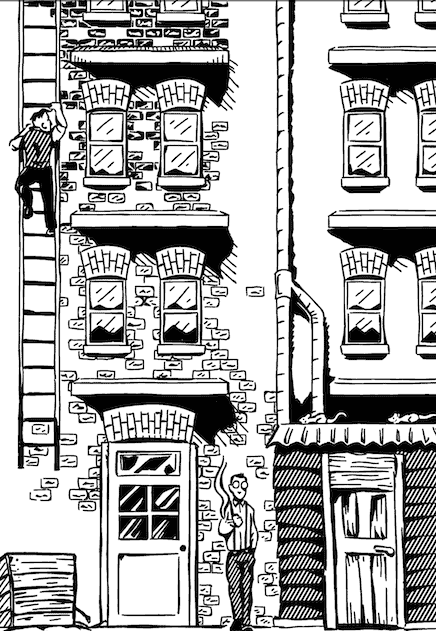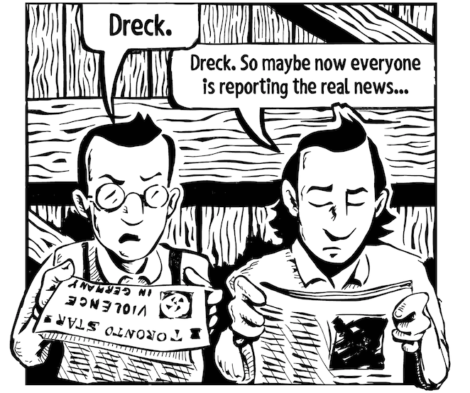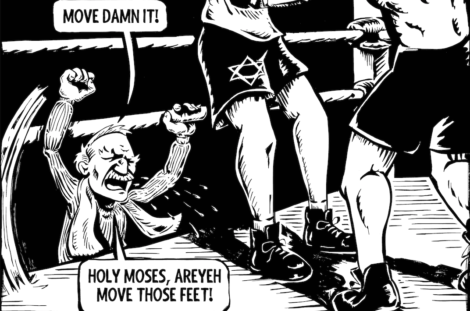Just a few blocks west of U of T’s campus is Christie Pits Park, the site of the infamous Christie Pits riots 84 years ago that occurred against the backdrop of the Great Depression, Hitler’s appointment to chancellor of Germany, and rising sympathy for fascism in the west.
On August 16, 1933, Jewish and Italian immigrants faced off against members of local Swastika clubs in a riot sparked by the defeat of the Harbord Playground, a mostly Jewish baseball team, in a semifinal for the junior city championships. The Pit Gang, a local group of Nazi sympathizers, raised a flag with a swastika emblazoned on it to celebrate the Playground’s defeat, and they were rushed by members of the Jewish team. Both sides called in thousands of reinforcements, and the brawl lasted six hours.
The riots are one of the most prominent examples of antisemitism in Canada, along with the “none is too many” policy upheld during the war years to prevent European Jewish émigrés from finding refuge in Canada.
Jamie Michaels is the founder of Dirty Water Comics, a Winnipeg-based comic book press that is currently raising money via Kickstarter to publish a graphic novel about the Christie Pits riots. He spoke to The Varsity about what drew him to the story of the riots and their modern significance.
Michaels said that he got involved in the comic book industry by “being at the wrong bar at the wrong time.” While couchsurfing and studying for his master’s degree in fiction at the University of London in the United Kingdom, a friend at a nearby pub invited him to meet an acquaintance who was looking to hire a freelancer at a larger press. He would later found Dirty Water Comics, which published its first novel, Canoe Boys, written by Michaels, in 2016.

Part of the reason Michaels was drawn to the story of the Christie Pits riots was a personal experience with antisemitism in his youth. He described attending a baseball game in Winnipeg when a “terrific fight” broke out after someone called a group of the kids in the stands “dirty Jews.”
“I could certainly see the factors that brought people out into the streets that night,” he said. When he later heard the story of Christie Pits, he was struck by the parallels between the riots and what he had experienced.
Michaels bluntly described the riots’ current relevance as “depressingly topical.”
“The relevance [the book] began to hold as the project moved forward just floored me,” said Michaels. He completed a 24-page rewrite of the novel after watching footage of white supremacist marches in Charlottesville, Virginia this past summer. “I think there’s no better time for a story about the dangers of those politics and the importance of people finding a way to live together.”

Michaels described the novel as a work of historical fiction. To accurately capture the mood of 1930s Toronto, he relied on the Ontario Jewish Archives and contemporary media coverage. Before writing each chapter, he would review the microfilm of the time, giving him insight into what Canadian Jews might have been feeling at the time of Hitler’s rise to power.
“Christie Pits is not the story of one person, it’s the story of a neighbourhood,” said Michaels. For this reason, he chose to write each chapter from the perspective of a different character, allowing their lives to intersect throughout the novel and create a sense of community. The characters range from a young boxer living off Spadina Avenue to a young family who moved from Europe to escape rising antisemitism and are still concerned for their family overseas.

Dirty Water Comics also received a grant from the Jewish Foundation of Manitoba to work on Christie Pits. “We’ve been really lucky to work in partnership with them,” said Michaels, noting that providing a grant to publish a comic book likely required a different calculus than the foundation’s previous grants for other cultural projects.
The script for Christie Pits is finished, and the final stage of illustration is underway, being done by Winnipeg-based illustrator Doug Fedrau. The Kickstarter campaign will end on December 15, and should it be successful, Michaels hopes to have the novel printed and distributed by March.


